Drawn in by its name, a new layer of revolutionary activists are joining the Young Communist League. But instead of educating members in Marxism, the YCL focusses its energies on stunts. We need to steel ourselves in the genuine ideas of Lenin.
Comrades, you have joined the Young Communist League (YCL) to fight against capitalism, and for socialist revolution. You were looking for a revolutionary party based on the ideas of Marx and Lenin.
The Communist Party was founded over 100 years ago with such ideas at its heart. Its early years were guided by Lenin’s advice and policy, and saw great successes.
But the seizure of power by Stalin in Russia, and the promotion of the theory of ‘socialism in one country’, distorted the work of Communist parties around the world, including in Britain, leading them into a blind alley of reformism and nationalism from which they have never escaped.
Never has this been clearer than today, in the depths of the deepest crisis of capitalism for 300 years. At precisely this moment, the Communist Party leaders shun the fight for revolutionary socialism in favour of mild reformism and a national ‘British Road to Socialism’.
The leaders of the Young Communist League (YCL), meanwhile, replace revolutionary education and propaganda with flares and food bank collections. The systematic work of building support for communist ideas among the working class is ignored in favour of stunts. The League prioritises style over substance.
These leaders swear by socialism in every other sentence, while they trample the programme and methods of Marx and Lenin in practice. In doing so, they sweep under the carpet the crimes of Stalinism.
But if you don’t learn from history, you will repeat its mistakes. After all, isn’t the revolutionary party supposed to be the memory of the working class?
Internationalism
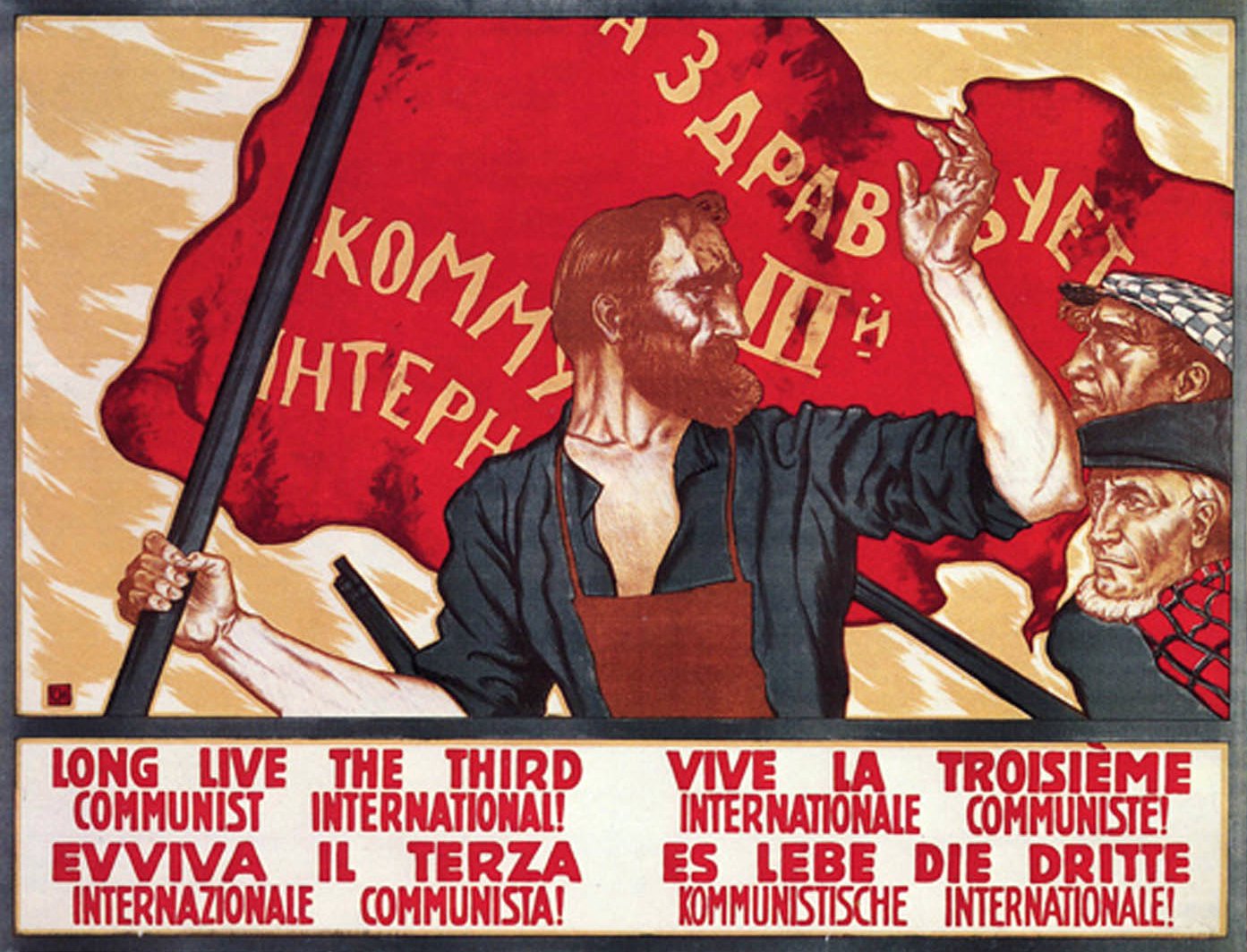
Marxism is based on internationalism, or it is nothing. The interests of the world socialist revolution are our starting point. This is rooted in the international character of capitalism itself.
Capitalism has created a world market, a world division of labour, and a worldwide working class. Capitalism has laid the material basis in terms of industry and technique for the development of world socialism and classless society. World revolution and international socialism were the basis of the teachings of Marx and Engels. This was fully understood by Lenin and the Bolsheviks.
From his first involvement in revolutionary politics, Lenin held true to an internationalist line. He tied the fate of the Russian Revolution to the European socialist revolution.
In fact, such was Lenin’s internationalism that he was even prepared to sacrifice the Russian Revolution for a successful revolution in Germany. He was an internationalist not just in words, but in deeds. And he had no time for petty nationalism within the revolutionary party.
The present policy of the Communist Party leaders has drifted very far from this Leninist approach. In the latest version of the Communist Party programme, Britain’s Road to Socialism, we find only two short paragraphs on internationalism buried halfway through the document.
In those paragraphs, internationalism is presented as a secondary afterthought, or a byproduct of the struggle for socialism in one country. For the Communist Party leaders, it is nothing more than a nice idea to be promoted, rather than the axis around which all revolutionary policy is based.
For example, the CP document says:
“International solidarity often plays an important role in helping workers and peoples fight and win battles for justice, peace, and freedom in their own countries.”
Compare this to Lenin’s writing in April 1918, as the Russian Revolution was consolidating power: “We shall achieve victory only together with all the workers of other countries, of the whole world…”
For Lenin, internationalism was central. But for today’s Communist Party leaders, internationalism is peripheral.
The document continues:
“Socialism’s values, principles, and aspirations can only be universal rather than purely local or national. In practice, however, this does not negate the primary, essential need to overthrow capitalism at the level where the capitalist class holds state power.”
In other words, internationalism is a nice ‘aspiration’, but is of little practical consequence in the struggle for socialism.
Marx disagreed. He built the First International in the 1860s, which was an active revolutionary organisation with sections across Europe, which intervened in the English trade unions and the Paris Commune. The statutes of the International were guidelines for practical revolutionary work. In them Marx wrote: “The emancipation of the workers is not a local, nor a national, but an international problem”.
Today’s leaders of the Communist Party directly contradict this when they write that overthrowing capitalism is primarily a national problem.
Given the international character of capitalism in the epoch of imperialism, capitalism as a whole cannot be overthrown purely on a national level. That is why Lenin established the Communist International in 1919, which was dissolved by Stalin in 1943 as a gesture to the Allies. The Communist International held up the banner of world revolution, which was abandoned by Stalin and his reactionary theory of ‘socialism in one country’.
History shows us that without the international extension of the socialist revolution, the revolution will be isolated and in danger of degeneration. That is why the Bolsheviks, who never held the idea that socialism could be established in backward Russia, regarded the Russian revolution as part of the world revolution.
Without a conscious and predominant policy of internationalism, any successes on a national scale can only ever be temporary.
Theory and practice
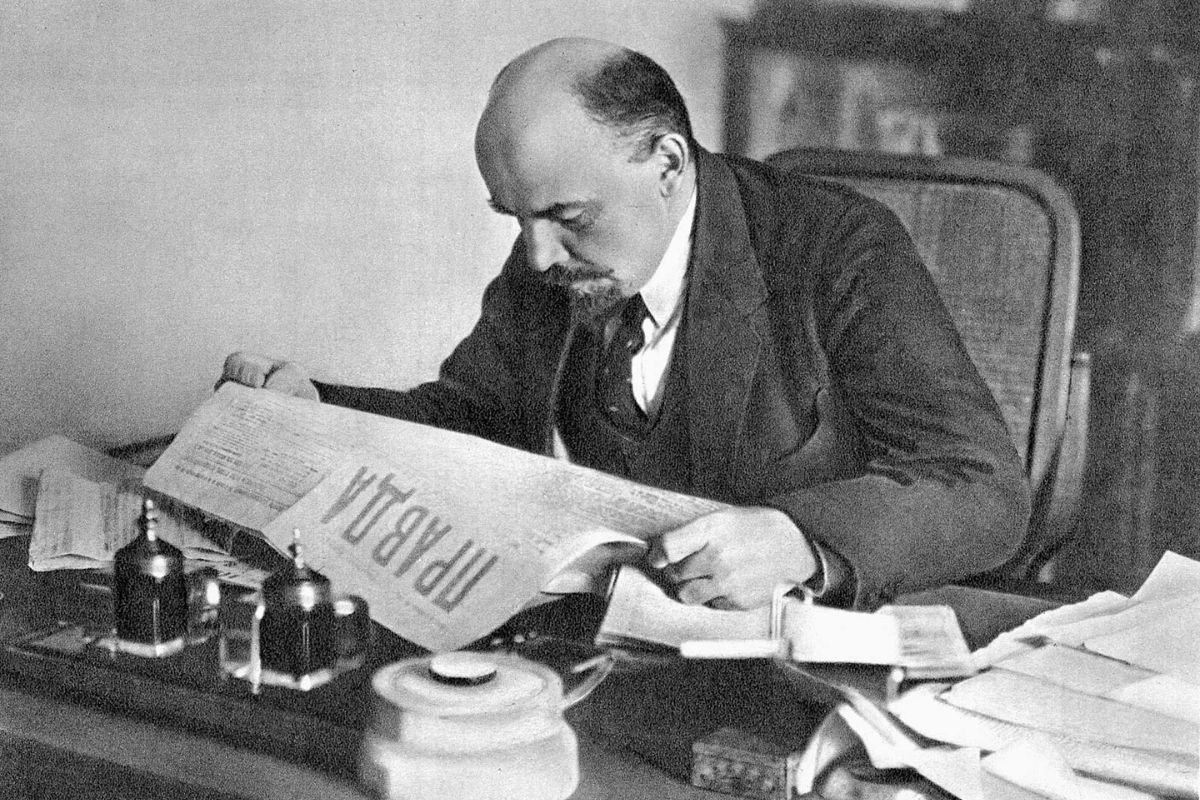
The relegation of internationalism to an “aspiration” which “often plays a role” in the class struggle has led the Communist Party leaders to abandon the perspective of world revolution, in favour of appeals to the international bourgeoisie (the so-called United Nations, for example) to solve the problems of capitalism and imperialism.
To fight the oppression of Palestinians, for example, genuine revolutionaries need a programme of class struggle methods, like the Palestinian general strike seen in May 2021. That means also arming the masses, and linking their struggle to overthrow capitalism with that of workers and youth across the region – including in Egypt, Turkey, Iran, and even within Israel itself.
This would be the basis for a Socialist Federation of the Middle East, which alone can guarantee the rights of all workers and youth throughout the region. On a capitalist basis, there can be no Palestinian liberation, because the Israeli capitalist class will never allow the existence of an independent sovereign Palestine.
The Communist Party leaders disagree. During the social explosion in Palestine last year, John Foster, the CP’s International Secretary, said:
“A two-state solution based on pre-1967 borders, establishing a sovereign state of Palestine alongside a secure Israel, remains the only realistic solution to the ongoing conflict and the oppression of the Palestinians.”
With this the CP leaders abandon any idea that the revolutionary struggle of the workers and youth of the Middle East can solve the Palestinian problem. Instead they put their faith in international diplomacy, presumably brokered by the bourgeoisie of other nations, to create “sovereign states” under capitalism.
This proposal suggests that it’s possible to reconcile the interests of the Israeli capitalists with those of the Palestinian masses, on whose oppression the Israeli rulers base their power. In what way this is a “realistic solution” is anyone’s guess.
The Communist Party policy, which has abandoned socialist revolution, is to demand that the capitalist class find a solution to the oppression of Palestine. A genuine socialist policy would work towards a Socialist Federation of the Middle East, the architect of which can only be the working class of the entire region.
China

CP policy in China also ditches international proletarian solidarity in favour of “Socialism with Chinese Characteristics”. They defend the idea that socialism is being built in China, when capitalism has been clearly re-established, under the tutelage of the so-called Communist Party.
Under Deng, the CP popularised catchphrases like “it is glorious to get rich” and assured the aspiring capitalists that it was acceptable for “some people to get rich first”. Under Jiang Zemin, capitalists were formally invited to join the party.
As the Evergrande crisis displayed last year, the Chinese economy is now capitalist to the core, backed by a strong state. Its fluctuations are determined by market forces and its policies are dictated by the needs of big business. Chinese economic growth is today based on the accumulation of more and more debt, which is a drag on further growth, and which is fuelling the crisis of overproduction that is wracking the Chinese economy.
To escape these contradictions, China must export more and more, and expand its own imperialist sphere of influence. This is the meaning behind its ‘Belt and Road’ initiative.
The growing class contradictions in China threaten outbreaks of social unrest, including in the important Xinjiang province, which is of great strategic importance to the Chinese ruling class, and where the Uyghur population is concentrated.
It is this, more than anything else, which explains why the Chinese ruling elite has ramped up oppression of the Uyghurs, including the use of ‘re-education camps’, the existence of which is not disputed by the Chinese state.
A Marxist policy towards China requires international solidarity with the Chinese workers and youth, who are increasingly struggling against Chinese capitalism and the vicious exploitation of the new ruling class.
The leadership of the CP and the YCL take the opposite view, aligning themselves with the Chinese ruling elite, instead of the workers and peasants.
Last year, during the centenary celebrations of the Chinese Communist Party, the general secretary of the CP, Robert Griffiths, said:
“[China’s development] has been made possible by the planned nature of economic and social development, with key industries and services under public ownership or control, directed and led by the Communist Party of China through its mass organisations and the established institutions of state.”
According to the CP, the Chinese economy is actually subject to planning and control by the Chinese masses. But if this is the case, what is the explanation for the Evergrande debt crisis?
How did it happen that, last year, Chinese energy companies turned people’s lights and heating off to force the government to remove the cap on energy prices so that they could make more profit?
China now has almost as many billionaires as the USA, while the working class faces brutal exploitation. This is especially the case for the nearly three million migrant workers in China, who have no rights.
How can such crises, big business diktats, and inequality be the product of planning and control by the masses?
In the same speech Griffiths said:
“In the finest internationalist tradition of the communist movement, China is also assisting other countries and peoples to accelerate their own economic and social development through the ‘Belt and Road’ initiative.”
The Belt and Road initiative is primarily aimed, not at enriching other countries, but at strengthening China, both economically and strategically.
For example, China currently controls Sri Lanka’s Hambantota deepwater port through a 99-year lease, and has lent heavily to the $4bn railway linking Kenya’s port of Mombasa with Nairobi. These strategic assets are to secure China’s control over imports and exports to these countries.
One part of the Belt and Road initiative is the China-Pakistan Economic Corridor. This involves a loan from China to Pakistan of almost $50bn, which will be paid back with interest at rates up to 6%.
Last October, a crisis erupted in Uganda when it became apparent that a $200 million loan from Chinese banks for the development of the airport in Kampala could grant the Chinese ruling class the right to seize the airport if repayments are not made.
The Belt and Road initiative is patently not a product of “the finest internationalist traditions of the communist movement”, but is rather a product of Chinese imperialism trying to strengthen its position.
Finally, Griffiths added:
“I have also learned not to trust any reports in the West about Xinjiang and its Uyghur people, having witnessed for myself how the Uyghur language can be seen and heard everywhere and how most of the top state and Party personnel there are themselves Uyghur-speaking Uyghurs.”
It is true that we should be deeply suspicious of the West’s crocodile tears for the Uyghur people. Western imperialism has cynically exploited and oppressed national minorities for centuries, and it is hypocrisy of the worst kind for them to condemn China’s treatment of the Uyghurs.
However, to deny that such oppression exists and is simply made up by the Western media is false. This flat denial of what the Chinese state itself doesn’t dispute requires closing one’s eyes to the facts. Similarly, the leaders of the British Communist Party for decades swallowed the line that Stalin was “building socialism” in Russia, which was shown to be false.
The mistakes of CP policy on China stem from the treatment of internationalism as a vague “aspiration” instead of a concrete task. Real internationalism requires a serious understanding of the regimes, economies, and class nature of different countries. On that basis, a programme for action can be developed.
The leaders of the CP and the YCL have replaced that with support for the Chinese capitalist regime, on the superficial basis that it uses the language and symbols of communism.
Proletarian internationalism or bourgeois nationalism?
The nationalism of the Communist Party leaders is repeated even more crudely by the leaders of the Young Communist League.
One of the recent campaigns listed on the YCL’s website is ‘online meetings about progressive patriotism’. In April this year, the YCL posted an image of the St George’s Cross on social media with the assertion that “the task of socialists is to reclaim national identity”.
🚩🏴 The Young Communist League sends greetings to working people across England on St George’s Day! This day – which should be a public holiday across Britain – is an opportunity to celebrate the radical history and modern diversity of England. (1/8) pic.twitter.com/OZPcpTmwtn
— Young Communist League of Britain (@yclbritain) April 23, 2022
This focus on giving a “left” colouration to English nationalism will only sow confusion and play into the hands of reactionaries.
Ideas of patriotism and nationalism are not inherent to working-class consciousness. They are deliberately promoted by the ruling class using every means at their disposal, to divide workers and strengthen national cliques of capitalists.
Communists should have nothing to do with this nationalist poison. Faced with relentless nationalistic and patriotic bourgeois propaganda, we must stand firm on a principled internationalist programme which remorselessly exposes the hollow lies of patriotism and nationalism.
If we capitulate to this propaganda even one inch, or try to combine socialism with bourgeois patriotism in some way, we will find that instead of turning nationalists into socialists, we will have turned socialists into narrow nationalists.
This is what Lenin explained: there is no middle ground between nationalism and internationalism. They are irreconcilably opposed camps. He wrote:
“Bourgeois nationalism and proletarian internationalism – such are the two irreconcilably hostile slogans that correspond to the two great class camps throughout the capitalist world and express two policies on the national question.” (Critical remarks on the national question, 1913)
The leaders of the YCL should reflect carefully on Lenin’s writings on nationalism and internationalism. The task of socialists is not to “reclaim national identity” but to be ruthless in our criticism of all ideas that divide workers and hold back the working class movement, including so-called ‘left’ patriotism.
Taking power in Britain
Every genuine communist wants to see power in the hands of the working class, in Britain and in every other country. How is this to be achieved?
In the Communist Manifesto, Marx and Engels explain that the workers cannot overthrow the capitalist class without first winning political power, that’s to say without transforming the state into the “proletariat organised as the ruling class”.
As Lenin explained:
“The basic question of every revolution is that of state power. Unless this question is understood, there can be no intelligent participation in the revolution, not to speak of guidance of the revolution.”
In State and Revolution, Lenin explains that “the chief and fundamental point in the Marxist theory of the state” is that “all previous revolutions perfected the state machine, whereas it must be broken, smashed.” This is the lesson that Marx drew directly from the experience of the Paris Commune.
In other words, for the working class to take power, the existing bourgeois state machinery of parliament, courts, police, army, prisons, etc. cannot be taken over and refined, polished or “perfected” to suit the interests of the working class. It must be smashed to pieces, to be replaced by newly created working-class state institutions, such as workers’ councils.
This, Lenin says, is a fundamental point of Marxist theory. It’s what distinguishes revolutionaries from reformists.
Unfortunately, this fundamental point of Marxist theory – upon which Lenin based his most famous theoretical work – has been jettisoned from today’s Communist Party programme.
In Britain’s Road to Socialism, the CP leaders provide us with a rigid blueprint of a revolutionary process, which develops through stages, and which hinges on capturing the existing bourgeois state machinery and wielding it in the interests of the working class.
“The opening stage in Britain’s socialist revolution will therefore have to culminate in the election of a left-wing government at Westminster, based on a socialist, Labour, communist and progressive majority at the polls”, says the document.
It continues:
“From the outset, the left government will have to introduce extensive changes in recruitment, staffing and management policies within the civil and diplomatic services, the judiciary, the police, the secret services and armed forces in order to replace key personnel with supporters of the revolutionary process.”
Members of the YCL may be thinking that changes to management techniques in the civil service is not the kind of ‘communist’ policy they signed up for. There is nothing Marxist or Leninist about this approach to the state, which aims to capture the bourgeois state apparatus and, bit by bit, refashion it into a tool for the workers.
The problem is that this is like trying to turn a dangerous tiger into a playful kitten by pulling its teeth out one by one. As soon as you pull the first tooth, you’ll likely lose your arm. The capitalist class is not simply going to sit by and watch its state apparatus be dismantled piece by piece.
Back in 2015, an unnamed serving general of the British army told the press that Corbyn would face a mutiny and a coup if he tried to scrap Trident, pull out of NATO, or shrink the armed forces in any way. Corbyn had only been leader of the Labour Party for a few months at the time, let alone leader of the country.
The idea that a left government would be able to introduce extensive changes to staffing policies in the armed forces without provoking a rebellion is a far-fetched and dangerous illusion to be peddling.
Our task is not to win positions in the bourgeois state apparatus. The key to socialist revolutions in the past has instead been the emergence of alternative forms of state power, built and operated by the working class. This is a phenomenon known as dual power.
In six pages setting out exactly how the revolutionary process is to unfold, there are just two sentences in the CP’s programme about these institutions which have formed the embryo of workers’ power in every proletarian revolutionary movement throughout history:
“New bodies of working-class and popular power are likely to be necessary to monitor or take over state functions and ensure implementation of the LWP [Left Wing Programme]. These are likely to emerge from the class struggle itself as trades unions, community organisations and other forms of popular action engage in the contest for power at local, regional, national and state level.”
What the CP leaders say is “likely to be necessary” (as if it is simply an option) as a supplement to reforming the bourgeois state apparatus, has, in fact, been instrumental in all past revolutions.
During the Russian Revolution, the organs of workers’ power were precisely the soviets. Elsewhere they have been workers’ and soldiers’ councils, factory committees, strike committees, or even neighbourhood committees. These embryos of workers’ power are key in any revolutionary overturn, as opposed to the illusory formal democracy we have under capitalism.
The revolutionary process has in each case consisted of a struggle between the opposing organs of state power – one representing the bourgeoisie, and the other the proletariat. The task of communists, in this situation of dual power, is to explain the necessity of transferring the entire state power to the working class. This is the essence of Lenin’s famous slogan: ‘All power to the soviets’.
It is certainly true that there are no soviets or workers’ councils in Britain today. If communists were to advance a slogan of ‘all power to the soviets’ at the present time, they would be rightly looked upon as absurd.
However, in the revolutionary period opening up, councils of action or extended strike committees, as in the 1926 General Strike, will be thrown up.
To sow illusions in a programme of reform of the bourgeois state apparatus is inexcusable for real communists.
Instead of reformist sloganeering, the leaders of the Communist Party and the YCL should be educating a new generation of revolutionaries in the history of past revolutions and the Marxist theory of the state. This would be serious preparation for the future revolutionary developments in Britain.
Reformism leads to defeat
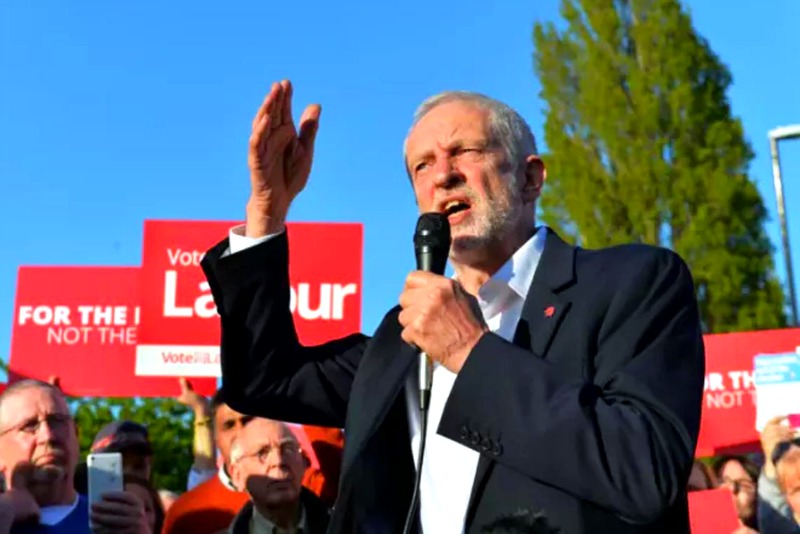
Abandoning the Leninist approach has led the CP leaders to make serious mistakes. For example, during Jeremy Corbyn’s leadership of the Labour Party, they saw him as the best chance for years of a left politician capturing a position in the bourgeois state machine, and so cheered his reformist policies uncritically.
The pages of the Morning Star were full of uncritical praise for Corbynism, even while Corbyn and his allies were continually trying to appease the right wing of the Labour Party, as the Blairites openly sabotaged the party on behalf of the ruling class.
The Corbyn movement, as a left reformist group, was incapable of dealing with this situation. They were not prepared to fight to the end against the right of the party. Their vision for transforming society was based on coming to an accommodation with the ruling class, rather than mobilising the working class in struggle.
As we have seen, this is also a fatal flaw of Stalinism and the Communist Party leadership.
Corbyn came under huge pressure and, in the end, after four years as leader of the party, he did not deal a decisive blow against the right, despite having the overwhelming support of the membership and the trade union rank and file.
Instead of warning Corbyn against compromise with the right, and encouraging him to deal a decisive blow against the Blairite MPs, the Morning Star published the following advice to Corbyn:
“On the whole, Labour could make room for more MPs who are in tune with the membership by ensuring more Jeremy-backing MPs can get selected when sitting MPs retire or get selected for newly marginal seats.”
In other words, it was argued that bit-by-bit reform of the Labour Party was the best way to turn it into a vehicle for socialism, rather than a head-on confrontation with the agents of capitalism.
As we know, the Labour right had no qualms about repeatedly and publicly confronting Corbyn head-on, which ultimately resulted in his defeat and resignation. This led to complete demoralisation of the Corbyn movement.
There are lessons to be learned from this: about the weaknesses of left reformism, and how revolutionaries should relate to mass movements around reformist leaders.
Unfortunately, the editorials published by the Morning Star after Corbyn’s defeat and just before Starmer’s election contain no explanation of the key lessons of this experience. They point out that Brexit was Corbyn’s undoing. But they don’t explain why Corbyn compromised on this question in the first place.
While we can give critical support to the left in the fight against the right, if revolutionaries reduce themselves to cheerleading every left reformist who appears in the labour movement, we will face a Corbyn-style defeat over and over again.
The Morning Star editorial board claims that “Jeremy Corbyn’s leadership has strengthened our movement”. But that will only be true if we understand why Corbyn failed, and how we can avoid the same outcome in the future.
The importance of Marxist theory
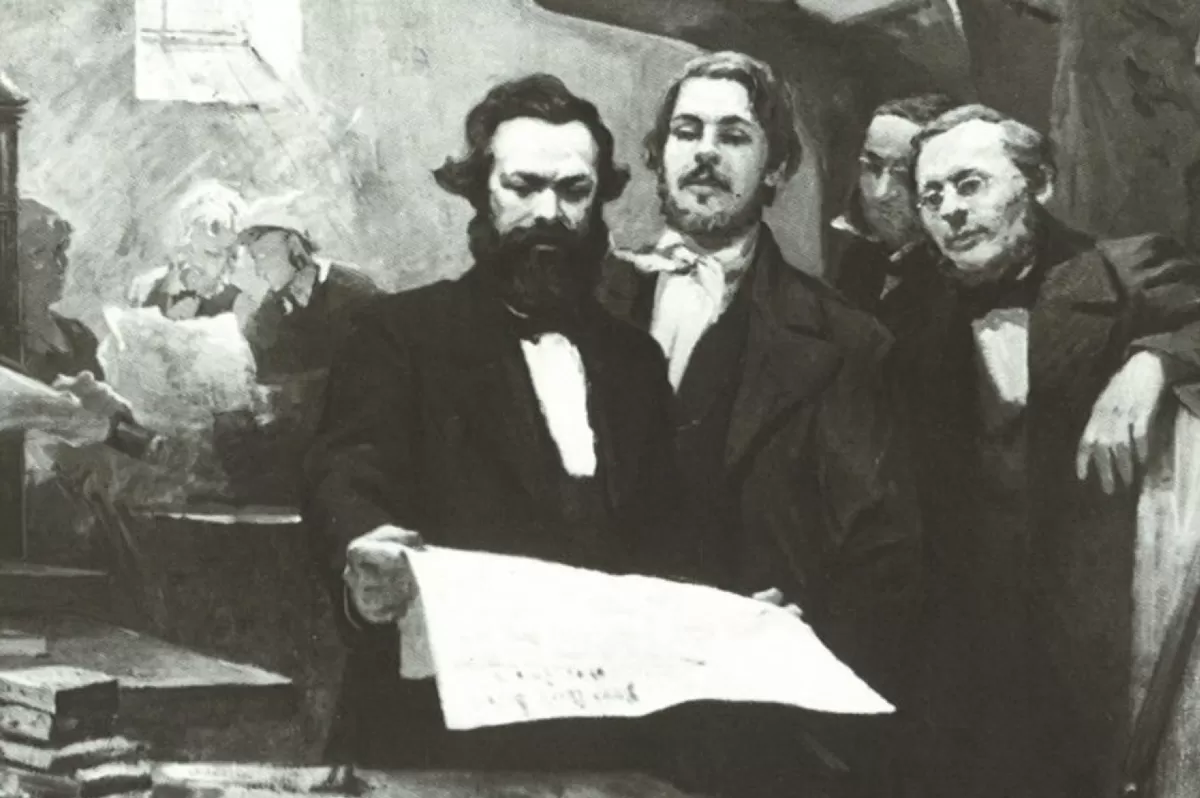
Without an understanding of genuine Marxism, and theoretical questions – like how capitalism works, imperialism, the national question, the state, etc. – it’s easy to make mistakes, as the CP leaders have proved.
This is why Lenin wrote, in the first chapter of What is to be Done?, that: “Without revolutionary theory there can be no revolutionary movement.”
This text was, effectively, the founding document of Bolshevism. It takes as its starting point the struggle for Marxist theory. It was on this basis that Lenin built a party capable of leading the Russian Revolution.
How did the Soviet Union go from a healthy workers’ state to a bureaucratic caricature of socialism? What is Stalinism? What did Lenin and Trotsky really stand for?
Want to find the answers to these key questions? Check out Wellred’s ‘Stalinism pack’!
🔗 https://t.co/wHe2istzzi pic.twitter.com/ibV24yCvIi
— Socialist Appeal (@socialist_app) July 15, 2022
It is unfortunate then that the CP and YCL leaders pay little attention to the systematic discussion, debate, and promulgation of Marxist ideas among their members and beyond. Theoretical questions are, in some quarters, even treated with contempt.
For example, in a letter to the Morning Star earlier this year, a member of the YCL argued that discussions over differences between Stalin and Trotsky “are wasting our time”. The dispute is portrayed as “tiresome rivalry”, like children squabbling in the playground.
But this is certainly not the case. For Marxists, this history cannot be brushed under the carpet. It is like saying the Russian Revolution is only of historical interest, nothing more.
The letter-writer thinks it’s a “distraction from getting real work done”. But surely, as communists, we need to know our history in order to learn from it?
“Those who do not learn from history are doomed to repeat it,” the saying goes. Genuine revolutionaries are Leninists and not Stalinists. But we therefore need to know the difference.
‘Stalinism’ is not simply a label, like a branded t-shirt, but the phenomenon of what went wrong in the Soviet Union. This was revealed at the 20th Congress of the CPSU – although the crimes were laid at the foot of one man, Stalin, as opposed to the Stalinist bureaucracy as a whole.
When the Soviet Union collapsed in 1991, many of the leaders who held a CP card went over to capitalism. They participated in the plunder of the country’s state-owned assets and emerged as the capitalist oligarchy that rules Russia today. These bureaucrats betrayed the revolution.
We cannot deny this history, as many have tried to do. The aforementioned YCL member argued in his letter that Stalin didn’t create any theories that diverged from Marxism-Leninism. How can that be so, when the Stalin regime presided over the purge trials of the 1930s, when the majority of Lenin’s Central Committee were murdered?
This travesty has nothing whatsoever to do with Marxism-Leninism, and everything to do with Stalinist political counter-revolution.
He asks if we are not bored by talking about our history. But we can’t bury our heads in the sand and pretend it didn’t happen. Whether you agree with Trotsky or not, we cannot escape the fact he led the October Revolution with Lenin and provided a Marxist analysis of Stalinism. He fought counter-revolutionary Stalinism for which he was murdered. We can choose to ignore it. But as Marx once said: ignorance never helped anyone.
Prioritising “getting real work done” over understanding Marxism seems to be the method of the YCL leaders. The League’s focus in recent months has been on banner drops, setting off flares, waving flags and chanting their own name on demonstrations (as well as Stalin’s name!), alongside collecting for food banks.
There’s nothing wrong with most of these things (except the glorification of Stalin). But they bring us no closer to educating a new generation of young people and workers in revolutionary ideas.
In What is to be Done?, Lenin explains that a focus on the struggle for Marxist theory “cannot be insisted upon too strongly at a time when the fashionable preaching of opportunism goes hand in hand with an infatuation for the narrowest forms of practical activity.”
While the Communist Party leaders preach opportunism both at home and abroad, and the YCL leaders infatuate themselves with the narrowest forms of practical activity, rank-and-file members of these organisations should demand a return to the genuine ideas and methods of Lenin and Marx.
Decisive class battles are approaching. Revolutionaries urgently need to build a party steeled in Marxist theory – one that can navigate the storm and stress of the coming events. The socialist revolution in Britain and internationally depends upon it.
We therefore appeal to all true revolutionaries and communists, who wish to build an organisation based upon the genuine ideas of Marx and Lenin, to join us in this historic task.

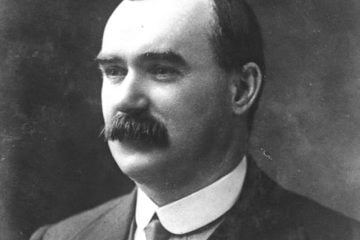
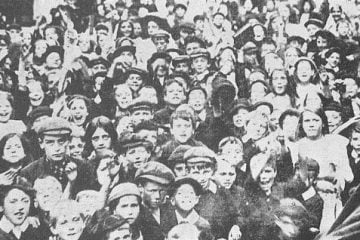

0 Comments